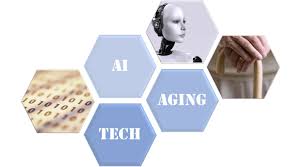Nuance Audio is a new option for people who resist traditional aids, from the company that makes Ray-Bans and operates LensCrafters.
Seekers of Meaning Podcast Posted Online March 7, 2025
What's Next Longevity Deal Talk Episode 32, January, 2025
Presentation: What's Next Longevity Venture Summit, June, 2025
WAWABILITY 2025, Washington DC, July, 2025

 What is care coordination and why is it so elusive? Catching my eye – a relatively new company, Sage, offers a ‘
What is care coordination and why is it so elusive? Catching my eye – a relatively new company, Sage, offers a ‘ The US population is aging and will be needing more care. You read it every day in the popular press – the bad news about the 65+ and their future care burden and the good news about the 65+ and their wealth (22% of US spending in 2022). Even with wealth, older adults at some point in their lives will need some level of assistance. While professional care providers will play a key role, increasingly their work will be augmented by software -- apps, machine learning and conversational AI. Why?
The US population is aging and will be needing more care. You read it every day in the popular press – the bad news about the 65+ and their future care burden and the good news about the 65+ and their wealth (22% of US spending in 2022). Even with wealth, older adults at some point in their lives will need some level of assistance. While professional care providers will play a key role, increasingly their work will be augmented by software -- apps, machine learning and conversational AI. Why? You know the statistics and they are alarming. Doctors and nurses are burning out,
You know the statistics and they are alarming. Doctors and nurses are burning out,  The halfway point -- research about Future of Care Work. Each interviewee was asked for thoughts in the context of the categories suggested by ChatGPT and any other categories that will improve the work processes for those in the care-related industries – home care, home healthcare, senior living care (including nursing homes), and hospital discharge processes to any of those. Few conversations focused on ChatGPT – instead it became apparent that innovation, including AI, is underway to optimize care work, focus on the workforce, and help keep care recipients at home:
The halfway point -- research about Future of Care Work. Each interviewee was asked for thoughts in the context of the categories suggested by ChatGPT and any other categories that will improve the work processes for those in the care-related industries – home care, home healthcare, senior living care (including nursing homes), and hospital discharge processes to any of those. Few conversations focused on ChatGPT – instead it became apparent that innovation, including AI, is underway to optimize care work, focus on the workforce, and help keep care recipients at home: Long ago 'aging in place' terminology emerged with a different meaning. Forgotten now, it was briefly in Wikipedia to define the benefit of a
Long ago 'aging in place' terminology emerged with a different meaning. Forgotten now, it was briefly in Wikipedia to define the benefit of a